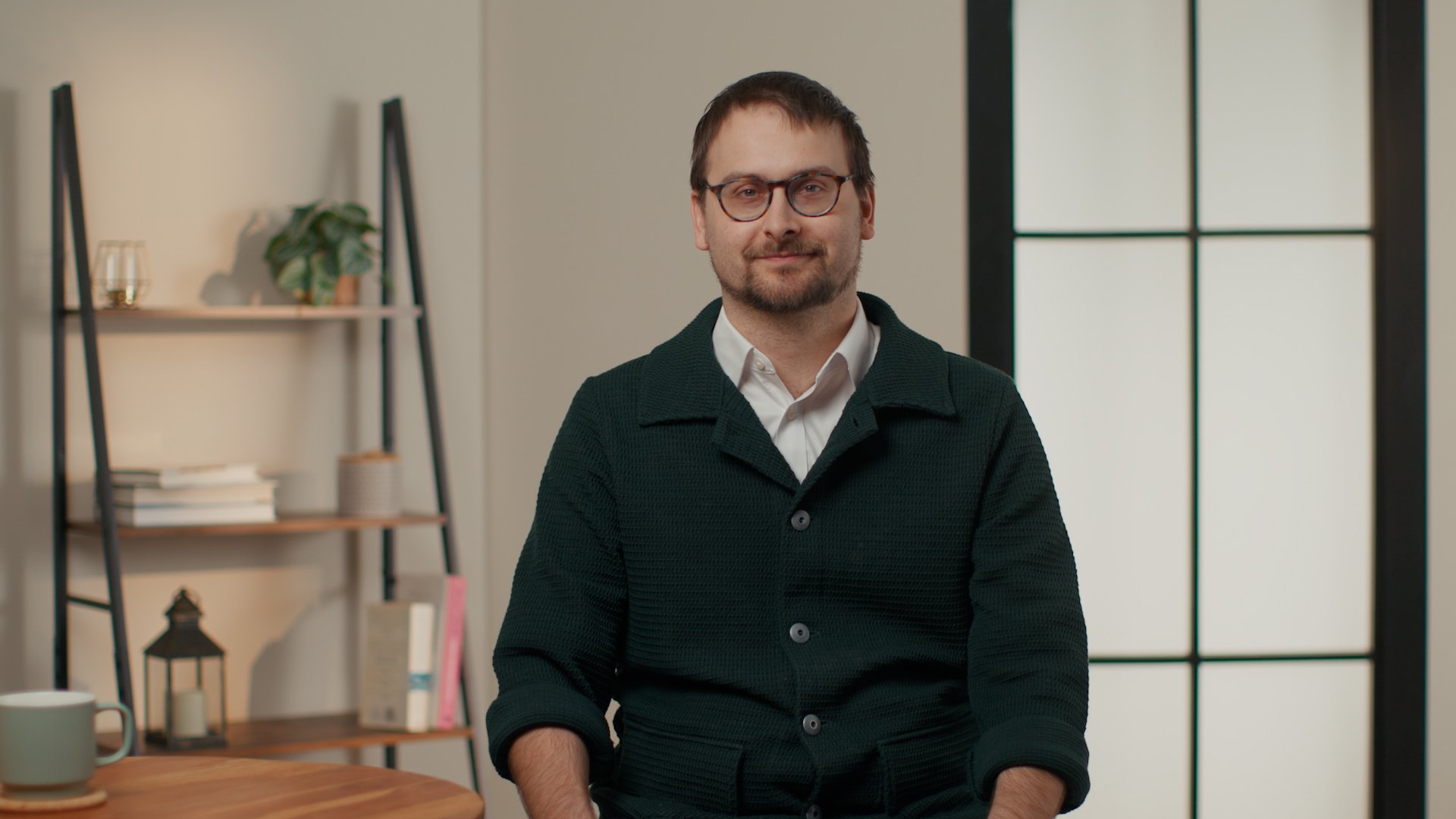Overview
Investment manager Iain McCombie and investment specialist Paul Roberts give an update on the Managed Fund covering Q4 2024.
As with any investment, your capital is at risk. Past performance is not a guide to future returns.
Paul Roberts (PR): Hello and welcome to this latest update on the Baillie Gifford Managed Fund. My name is Paul Roberts, I'm a specialist on the fund and I'm joined by Iain McCombie, co-manager of the fund. We'll spend the next 10 minutes looking back over the latest quarter and 2024 as a whole, reviewing what's been happening in the fund and looking ahead to what might be in store for 2025.
The strategic asset allocation of the fund is 75 per cent equities, 25 per cent cash and bonds. So typically the driver of returns will be the underlying companies. The fund has comfortably beaten the peers in its sector over the last 12 months. So Iain, let's start there. What's been the driver of that good performance?
Iain McCombie (IM): Yes, Paul, I think what we saw last year was the US exceptionalism coming to the fore again. The US stock market being very strong, particularly the Magnificent Seven, I'm sure lots of people have heard about that. But what I think was also interesting was that started to broaden out as the year went on. And that started to really, I think, start to play into our game. Essentially, share prices starting to follow fundamentals. But I think it's also important to say it wasn't just about US technology stocks. Some of our best performing stocks last year were things like Marks & Spencer in the UK, Sweetgreen, which is a US kind of fast food business, and TSMC, which is a Taiwanese technology provider, which is really quite important for the technology sector.
PR: Yes, absolutely. And I guess that US exceptionalism was quite stark, the performance of US markets relative to other regions. So how have you been thinking about reacting to that?
IM: I think the most important thing, Paul, is we tried to learn some of the lessons of a few years ago where we had, you know, the kind of, effectively, the boom and bust in the US. And what we've done is two things, one at the portfolio level and one at the asset allocation level. So at the portfolio level, what we've done is we've been taking some profits from some of our best-performing stocks. So, for example, we've taken money out of Tesla after it performed extremely well, you know, through last year. So that's hopefully learning that lesson and recycling into businesses, which we still think are very attractive growth businesses, but at much lower valuations. At the asset allocation level, again, we've been trying to learn some of the lessons, hopefully. And we've taken some of the money out in our recent asset allocation, out of the US and we put it into cash. So actually banking some of that really strong absolute returns we've been getting from our US portfolio and not getting carried away with it.
PR: Okay, so great returns driven by good share price performance of the underlying companies. Naturally, that's where you like to start, the underlying companies, that will generally drive long-term returns. But I guess our viewers are probably interested in your views of the broader macroeconomic environment, what's going on in the world that might drive shorter-term performance. We saw a lot happening in the last quarter, US elections, unsettled politics in Europe. We obviously still have the situation in the Middle East and Ukraine. What do you see the outlook from here?
IM: I mean, look, Paul, I'm not one of these guys with a crystal ball that kind of wants to pontificate about Trump or whatever. I think what we would say is if you look at the consensus numbers, it's actually we're set reasonably well for growth and inflation globally, which is not a bad environment for growth investors such as ourselves. A lot of the other stuff that you talked about, provocatively, how much of that is going to be noise? Will we remember a lot of that in a few years' time? And what we're trying to do is not get sucked into that kind of short-term guessing game. What we're trying to do as bottom-up investors, as you said, is to kind of look at the focus on finding great companies with those long-term growth prospects. And that's really what we've been trying to do there.
PR: And are there some examples that you've found in the latest quarter that have been added to the portfolio?
IM: Yes, well, there's a couple in the UK which I think are interesting because they're not, as I say, not the standard technology-related businesses. One is a company called Cranswick, which is a food producer in the UK. Now, you might think, you know, Iain, what are you doing? You know, food producers, that's surely not a great business. Well, actually, it's got a terrific long-term track record. And why is that? It's the number one player in pork products in the UK. It's moving into poultry as well. It's actually quite a cash-generative business with reasonable margins. And what they've been doing is reinvesting that to make it basically the state-of-the-art facilities, the best facilities in the UK. Supermarkets like that a lot. And one of the things that I'm sure people can remember coming out of Covid was the security of supply and empty supermarkets and so on. Well, Cranswick never let their customers down, and they've been picking up more business for that. And then the other thing I think is really important is product development, what they've been doing there is producing products, your higher quality kind of products that people are willing to pay for. Supermarkets love it because they make more money and Cranswick make more money. So that's one example. A second one is a company called Applied Nutrition, which is an IPO (Initial Public Offering) in the UK. Now, as the name suggests, it makes nutrition products for the sports kind of markets. It's an entrepreneurial business. A founder set it up 10 years ago. It's growing rapidly. It's in about 80 countries. It's starting to pick up business in some quite interesting markets like the US. And we think it's a really interesting growth business for the future.
PR: Sounds interesting. If we come back to that kind of consensus scenario, I guess, good growth, lower inflation. There's a few signs that might be challenging that. I guess inflation in the US has been a bit more sticky. Pace of interest rate cuts is expected to be slower. Growth, on the other hand, in Europe is probably slower than expected. How are you thinking about positioning for those alternative scenarios?
IM: Look, you're absolutely right to say that consensus scenarios are usually wrong. But the question is, where could it go? And again, we don't spend a huge amount of time worrying too much about that. And as a fund, the managed fund is not an all-weather, trying to outperform in every scenario. We are a growth, bottom-up house. Some of those scenarios you're talking about there, might it be a little bit more tricky for growth in the short term? Yes, it could be. But the advantage that we have are we have investments in strongly growing businesses with strong balance sheets. And that means they can ride out some of that short-term volatility that you or perhaps some of the investors might be worried about. And we think in the long run, share prices will follow fundamentals.
PR: Absolutely. So there's plenty to digest there. How would you summarise your thoughts looking to the year ahead?
IM: Well, I think the first thing is, I think valuations are a bit higher, but they're still, I think, reasonable. We're not worried about that. And that's why we still have an overweight position in equities, because we still see those opportunities there. What we're doing as fund managers in the portfolio is continue to do what we've always done. We keep finding those bottom-up attractive ideas and the managers remain upbeat. And therefore, we still remain of the view that the Managed Fund, which has been going for over 30 years, is well-positioned to be a core part of somebody's portfolio.
PR: Absolutely. Thanks, Iain. And I guess that, for me, is a key takeaway that the simplicity of the Managed Fund is its key strength. It's a broadly diversified, balanced portfolio that you can hold over time, but equally has access to some fantastic long-term growth opportunities through a wide array of companies whose share prices will ultimately follow the fundamental progress they've been making. Thanks for listening. And if you've got any questions, please do get in touch. Thanks, Iain. Thanks, everybody.
Annual past performance to 31 December each year (net%)
| 2020 | 2021 | 2022 | 2023 | 2024 | |
|
Baillie Gifford Managed Fund B Acc |
33.9 |
4.3 |
-24.3 |
10.7 |
8.9 |
|
IA Mixed Investment 40%-85% |
5.3 |
10.9 |
-10.0 |
8.1 |
9.0 |
Source: FE, Revolution. Net of fees, total return in sterling. Class B Acc Shares.
Past performance is not a guide to future returns.
The manager believes an appropriate comparison for this Fund is the Investment Association Mixed Investment 40-85% Shares Sector median given the investment policy of the Fund and the approach taken by the manager when investing.
Risk factors
This communication was produced and approved in January 2025 and has not been updated subsequently. It represents views held at the time and may not reflect current thinking.
The views expressed should not be considered as advice or a recommendation to buy, sell or hold a particular investment. They reflect opinion and should not be taken as statements of fact nor should any reliance be placed on them when making investment decisions.
This communication contains information on investments which does not constitute independent research. Accordingly, it is not subject to the protections afforded to independent research, and Baillie Gifford and its staff may have dealt in the investments concerned.
Baillie Gifford & Co and Baillie Gifford & Co Limited are authorised and regulated by the Financial Conduct Authority (FCA). Baillie Gifford & Co Limited is an Authorised Corporate Director of OEICs.
Investment markets can go down as well as up and market conditions can change rapidly. The value of an investment in the Fund, and any income from it, can fall as well as rise and investors may not get back the amount invested.
The Fund’s share price can be volatile due to movements in the prices of the underlying holdings and the basis on which the Fund is priced.
Further details of the risks associated with investing in the Fund can be found in the Key Investor Information Document or the Prospectus, copies of which are available in the documents section of the relevant fund page.
Receive regular emails, including manager updates, insights articles, podcasts and event invites.
SubscribeRelated insights

Asia's multi-faceted growth story
China's innovation and Vietnam's reforms create a compelling investment case in Asia.June 2025
Video|40 minutes
Profile of a sustainability researcher
Explore how Ben Hart's sustainability research at Baillie Gifford integrates ESG into investment strategies.May 2025
Video|6 minutes
Schiehallion Fund: Manager Insights
Reflections on performance, portfolio companies and opportunities for returns in the year ahead.May 2025
Video|7 minutes

